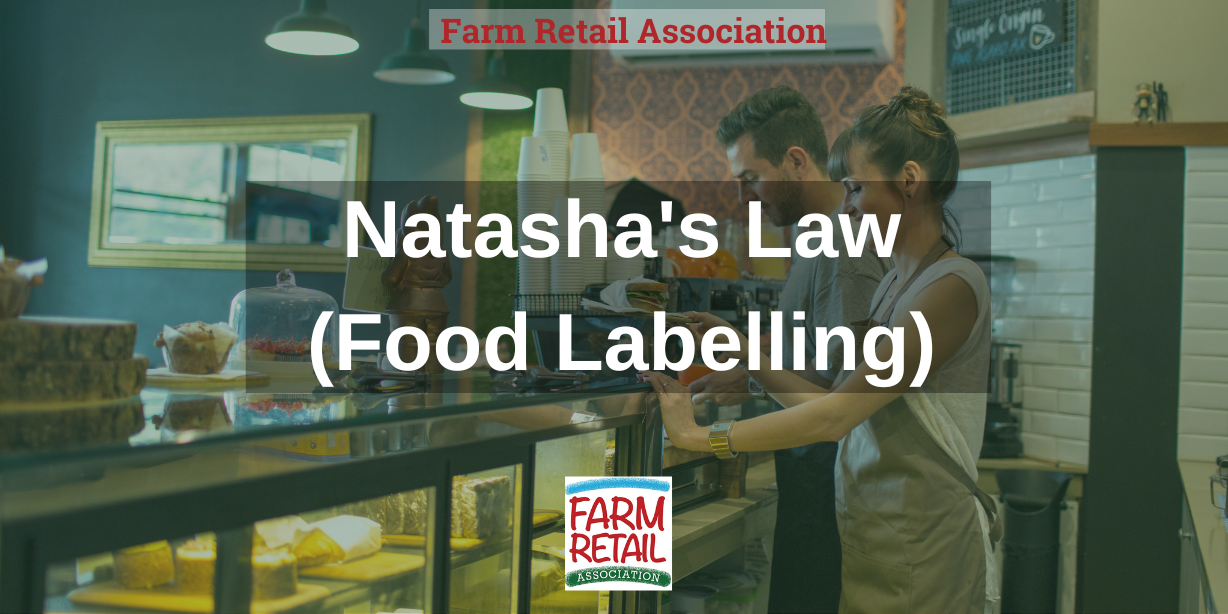Food labelling in Farm Shops
On 17 July 2016 Natasha Ednan-Laperouse bought a baguette from a PRET store. Natasha was allergic to sesame but due to inadequate labelling, was unaware that the baguette she bought had sesame baked into the bread. Sadly, she died later that day from an allergic reaction.
Natasha’s parents petitioned for a change in the law to ensure that those who suffer from allergies can safely shop for and eat pre-packaged food. The UK Food Information (Amendment) Regulations 2019, better known as Natasha’s Law, came into force on 1 October 2021.
Although the law is vital for the protection of those with allergies the law does place additional burdens on food producers, retailers and their staff. The law is wide-ranging and also encompasses businesses such as restaurants, and cafes and will impact many FRA Members. What happens if employees or businesses fail to meet these obligations?
Farm Retail Association Members are entitled to 1 hour free HR advice every month, details can be found here.
What does Natasha’s Law mean for my business?
From 1 October 2021 any business which produces or packages food must comply with the legislation to ensure all food is properly labelled to identify any of the 14 prescribed allergens:
- Celery;
- Cereals containing gluten;
- Crustaceans;
- Eggs;
- Fish;
- Lupin;
- Milk;
- Molluscs;
- Mustard;
- Peanuts;
- Sesame;
- Soybeans;
- Sulphur dioxide and sulphates; and
- Tree nuts.

A business’s obligation to label will vary depending upon the type of food being sold, pre-packaged or loose food. More specific information can be found here.
It means that business owners are completely reliant on their staff properly labeling produce to ensure that legal obligations under Natasha’s law are met. Business owners can be vicariously liable for omissions and mistakes made by its employees and could be at fault for mis-labelling. It is therefore imperative that businesses:
- Train their staff in Natasha’s law;
- Keep records of all training;
- Continually manage employees who are responsible for labelling;
- Carry out spot-checks;
- Discipline employees who fail to comply with obligations in this regard.
How does Natasha’s law affect free-from foods?
Over the past few years, there has been a huge increase in free-from, gluten-free and vegan foods, food businesses should be aware that a ‘free-from claim’ is a guarantee that food is suitable for all with allergies and intolerances.
If the risk of cross-contamination cannot be completely removed in food preparation areas businesses might not be able to make free-from claims. The Food and Drink Federation have created specific guidance on when free-from claims can and cannot be made.


How should you provide allergen information to customers?
Where pre-packaged food is being sold the ingredients must be detailed on the packaging.
If food is being sold directly to customers, whether that be in a pub, cafe, restaurant, takeaway or any other food business full allergen information should be available on a menu, board or in an information pack. In the alternative, a written notice can be displayed telling customers where they can access the information.
Allergy information can be provided as part of a conversation, but it is recommended that this is always followed up in writing.
If you provide food by way of a buffet you should provide allergy information for each item of food individually, not for the buffet as a whole.
If food is sold at a distance, by way of online order or over the phone, allergen information must be provided at two stages in the process. Firstly at the time of order, this can be displayed on a website or menu for example or given orally. Secondly, when the food is delivered, this can be by way of stickers, an enclosed menu or over the phone. Food businesses must ensure takeaway dishes are properly labelled to ensure that there is no confusion when the food is received by the customer.
It is now commonplace for waiting on staff to ask customers if they have allergies. This is a simple but effective way to ensure allergy information is given to those who need it. This does not negate the need to have detailed allergy information displayed publicly.
What steps should I take to protect customers?
Food businesses must comply with the regulations and ensure that the necessary information is being given at the right time. This means that all staff who prepare and handle food should be trained in this regard, as well as proper delegation of checks within the management team.
Furthermore, food hygiene and preparation practices should be as detailed as possible to ensure cross-contamination and keep a detailed record of allergens.
The Food Standards Agency has developed a series of information packs for caterers to help them uphold high standards and comply with Natasha’s Law.
FRA Members should ensure that staff are properly trained, whether it be kitchen staff to ensure there is no cross-contamination, front-of-house staff to check that signage and information are readily available or waiting staff to ask about any allergies if that is the process. Employment Law Solutions can assist in ensuring your policies are included in your Employee Handbook via the FRA HR Helpline and that your disciplinary policy refers to failure to comply with these obligations as potentially a gross misconduct offence.
It would be wise to regularly audit or check the working practices of the team to ensure that staff are upholding high standards and Member businesses can then correct any errors where they arise.
What is the risk if I don’t comply with Natasha’s law?
The obvious risk is that a person becomes seriously ill which may even result in death as in the tragic case of Natasha. This can of course seriously affect the reputation of a non-compliant business and business owners can be vicariously liable.
There are also legal risks to non-compliance.
Enforcement of the regulations is the duty of the Local Authority, much the same as food hygiene. If businesses are not compliant an improvement notice may be issued, hygiene scores could be affected or a fine issued in serious cases.
Business owners should also be aware that they could be criminally prosecuted in the event of the death of a customer.

What should I do if my staff don’t comply with Natasha’s law?
If they don’t comply you should discipline employees! Do not hesitate to do so. Members should use the Free HR Helpline for assistance.
FRA Members should ensure that a detailed induction programme covers expectations in relation to all aspects of compliance with Natasha’s Law. Business owners should undertake regular re-training to ensure that staff are aware of their obligations and that they continue to comply with their obligations.
Where an employee fails to comply with the obligations under the legislation and members are reluctant to discipline, they should at the very least offer re-training and formal words of advice.
Given the potential risks posed by failing to comply with the law issuing a disciplinary sanction, whether that be a written warning or something more serious, is perfectly reasonable. Of course, employers must follow a fair procedure and be able to demonstrate both adequate training and employee’s failings.
THE FRA HR Helpline exists to advise on matters such as this, your lawyers, who are just a phone call away can guide you through this complex matter.
“We have used the FRA HR Helpline on numerous occasions and the team are always very professional and knowledgeable. We like that fact that the team actually advise on legal matters and don’t sit on the fence.” Sam, Villa Farm.
Let us help cure your HR Headaches
Natasha’s Law came from a tragic incident but is a vital piece of law to protect those with allergies but also FRA Member businesses and their owners from potential risks. Compliance with the legislation is not an optional extra and failing to comply can have huge ramifications for customers, businesses and business owners. The main business concern is to ensure that staff are properly trained and that where an error has occurred it is dealt with swiftly.
Employment Law Solutions offer Employment Law and HR advice to businesses across the hospitality and leisure sector on all HR Headaches. Farm Retail Association Members are entitled to 1 hour of free advice each month as part of their membership, we can assist you in ensuring you properly enforce Natasha’s Law. FRA Members can BOOST their service and benefit from a monthly retainer service offering 24/7, 365 days a year support, all while spreading the cost over equal, discounted, monthly payments.
Call us on 01270 295 296 or click here to read other blogs drafted specifically for FRA Members.




